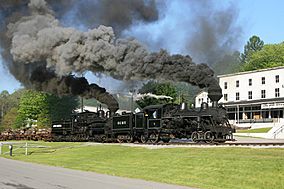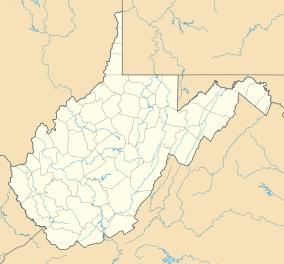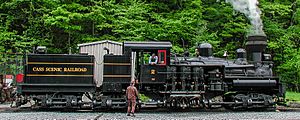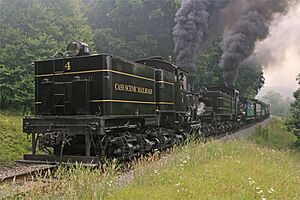Cass Scenic Railroad State Park facts for kids
Quick facts for kids Cass Scenic Railroad State Park |
|
|---|---|
|
IUCN Category III (Natural Monument)
|
|

Cass Scenic Railroad Heisler #6 along with Shay #11 lead a loaded log train down the former C&O Greenbrier Division mainline.
|
|
| Location | Pocahontas County, West Virginia, United States |
| Nearest town | Cass, West Virginia |
| Area | 940 acres (380 ha) |
| Elevation | 2,438 ft (743 m) |
| Established | March 7, 1961 |
| Named for | Former logging railroad at Cass, West Virginia |
| Governing body | West Virginia Division of Natural Resources |
|
Cass Scenic Railroad
|
|
| Location | Cass, West Virginia |
| Built | 1900-1960 |
| NRHP reference No. | 74002019 |
| Added to NRHP | July 12, 1974 |
The Cass Scenic Railroad State Park is a special place in Cass, West Virginia. It's both a state park and a historic railroad. This park lets you step back in time to see how logging was done long ago.
The park includes the Cass Scenic Railroad, which is about 11 miles (18 km) long. This railroad is owned by the West Virginia State Rail Authority. It's operated by the Durbin and Greenbrier Valley Railroad. The park also has the old company town of Cass and part of Bald Knob. Bald Knob is one of the highest points on Back Allegheny Mountain.
Contents
A Journey Through Time: History of Cass
The town of Cass began in 1901. It was built by the West Virginia Pulp and Paper Company (now WestRock). Cass was a "company town," meaning the company owned everything. It provided homes and stores for the workers. These workers cut down trees like spruce and hemlock in the nearby mountains.
The sawmill in Cass was once the biggest of its kind in the world. It processed a huge amount of wood, about 1.25 billion board feet, during its time. That's enough wood to build many, many houses!
Building the Railroad and Logging the Mountains
In 1901, work started on the railroad. It was called the Greenbrier, Cheat and Elk Railroad. This railroad was built to climb up Back Allegheny Mountain. It reached a spot called Whittaker Station, where a logging camp was set up. Immigrants worked hard to build this railroad.
The railroad kept going, reaching places like Gobblers Knob and then 'Spruce'. A small town was built at Spruce with a store, houses, and a doctor. Workers then started logging the red spruce trees that grew high up.
At first, the company only wanted red spruce for making paper. But later, they found many valuable hardwoods like maple and oak. So, they built a new mill in Cass to process these different kinds of wood.
The railroad eventually reached the top of Bald Knob. This is the third-highest mountain peak in West Virginia. After all the red spruce was cut down there, the tracks were removed in the early 1910s.
Changes and New Beginnings
In 1942, the Cass operation was sold to the Mower Lumber Company. They continued logging until 1960. By then, the timber industry was slowing down. So, the mill and railroad closed.
After closing, the railroad and equipment were almost scrapped. But a group of local business people had a great idea! They convinced the state of West Virginia to turn the Cass Railroad into a state park. In 1963, the first tourist train left Cass, heading to Whittaker Station.
The railroad became a nationally recognized historic place in 1974. In 1977, the Cass Scenic Railroad State Park took over the entire company town and the old mill. Since 2015, the Durbin and Greenbrier Valley Railroad has been running the trains.
Experience Cass Today
Today, visitors can ride on historic log cars. These cars are pushed by powerful geared logging locomotives. You'll travel on the same 11 miles (18 km) of track laid by immigrant workers in 1901. The journey takes you up the steep slopes of Back Allegheny Mountain.
The railroad has many unique locomotives. It owns eight Shay locomotives, one Heisler locomotive, and one Climax locomotive. These are special "geared" locomotives. They were designed to climb steep mountain tracks better than regular trains.
Exciting Train Trips
You can choose from three different train trips:
- A two-hour trip to Whittaker Station.
- A five-hour trip to the old "ghost town" site of Spruce. This was once known as the coldest and highest town east of the Rockies.
- A five-hour trip to Bald Knob, the third-highest point in West Virginia.
Stay and Explore
You can even rent the old company houses in Cass! They have been fixed up for visitors. There's also a small cabin on Bald Knob for rent. You can even reserve cabooses for a private experience.
Tours of the town and the train shops are available daily. You can learn about the lumber industry and see how these rare geared locomotives are cared for. There's also a recreated logging camp at Whittaker Station to explore.
Who Runs the Park?
Since 2015, the Durbin and Greenbrier Valley Railroad (D&GV) has been in charge of running the trains. They handle the train schedules, staff, and maintenance of the railroad. The West Virginia Division of Natural Resources (WVDNR) still owns the land and equipment. They also manage the rest of the park, like the historic town, visitor's center, and cottage rentals.
Locomotives at Cass and Durbin
Here's a look at some of the special locomotives you might see:
| Cass No. | Type | Manufacturer | Date built | Status | Notes |
|---|---|---|---|---|---|
| 2 | Shay | Lima Locomotive Works | 1928 | Operational | In service |
| 4 | Shay | Lima Locomotive Works | 1920 | Operational | In service |
| 5 | Shay | Lima Locomotive Works | 1905 | Operational | West Virginia state locomotive, oldest operational Shay |
| 6 | Heisler | Heisler Locomotive Works | 1929 | Operational | In service |
| 6 | Shay | Lima Locomotive Works | 1945 | Operational | Ex-Western Maryland Railway No. 6; Cass's biggest engine, largest surviving Shay, and the last Shay ever built. |
| 9 | Climax | Climax Locomotive Works | 1919 | Operational | Restoration completed in September 2019. |
| 11 | Shay | Lima Locomotive Works | 1923 | Operational | In service |
See also
- Bald Knob
- Leatherbark Run
- List of heritage railroads in the United States
- List of West Virginia state parks
- Steam railroad
 | Ernest Everett Just |
 | Mary Jackson |
 | Emmett Chappelle |
 | Marie Maynard Daly |




